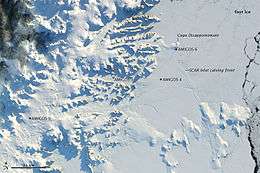Scientific Committee on Antarctic Research
.gif) | |
| Abbreviation | SCAR |
|---|---|
| Formation | February 1958 |
| Type | INGO |
Region served | Worldwide |
Official language | English |
Parent organization | International Council for Science (ICSU) |
| Website |
scar |
The Scientific Committee on Antarctic Research (SCAR) is an interdisciplinary body of the International Council for Science (ICSU).

History
It was established in February 1958 to continue the international coordination of Antarctic scientific activities that had begun during the International Geophysical Year of 1957-58.[3] SCAR is charged with the initiating, developing and coordinating of scientific research in the Antarctic region.[4] The scientific business of SCAR is conducted by its Standing Scientific Groups. SCAR also provides scientific advice to the Antarctic Treaty Consultative Meetings and other organizations on issues of science and conservation affecting the management of Antarctica and the Southern Ocean. In that role, SCAR has made numerous recommendations on a variety of matters, very few of which have been incorporated into Antarctic Treaty instruments.[5][6]
Activities
SCAR meets every two years to conduct its administrative business at the SCAR Delegates Meeting. An Executive Committee elected from the delegates is responsible for the day-to-day administration of SCAR though its Secretariat at the Scott Polar Research Institute in Cambridge, England. The Executive Committee comprises the President and four Vice-Presidents. The SCAR Secretariat is staffed by the Executive Director, Executive Officer and an administrative assistant.
SCAR also holds, prior to the Delegates Meeting, a major Open Science Conference to draw attention to Antarctic issues, along with meetings of the Standing Scientific Groups that are designed to finalise the Science Programmes for eventual approval by the Delegates.
In 2002 SCAR received the prestigious Prince of Asturias Award for International Cooperation.[7][8]
SCAR medals
Since 2006, SCAR has awarded three medals biennially in recognition of excellence in Antarctic and Southern Ocean research and outstanding service to the international Antarctic community.[9] There is one medal for Excellence in Antarctic Research, one for International Scientific Coordination, and the SCAR President's medal for Outstanding Achievement. Presentations are made at the SCAR Open Science Conference and are intended to reward the those who exemplify the best of the Antarctic community and serve as role models for the next generation.[10]
See also
References
- ↑ "Scar Inlet". data.antarctica.gov.au. Retrieved 2015. Check date values in:
|access-date=(help) - ↑ Roston, Eric. "Glacial Death Watch: Why an Ice Shelf Snapped in 2002 and What's Coming Next". Bloomberg.com. Retrieved 2015-12-21.
- ↑ "Scientific Committee on Antarctic Research". dels.nas.edu. Retrieved 2015-12-21.
- ↑ "Antarctic Research (SCAR)". www.icsu.org. Retrieved 2016-06-06.
- ↑ Gramling, Carolyn (2015-08-11). "Report sets new goals for U.S. Antarctic Program". Science. doi:10.1126/science.aad1602.
- ↑ Kennicutt, Mahlon C.; Chown, Steven L.; Cassano, John J.; Liggett, Daniela; Massom, Rob; Peck, Lloyd S.; Rintoul, Steve R.; Storey, John W. V.; Vaughan, David G. (2014-08-07). "Polar research: Six priorities for Antarctic science". Nature. 512 (7512): 23–25. doi:10.1038/512023a.
- ↑ "The Scientific Committee on Antarctic Research - Laureates". The Princess of Asturias Foundation. The Princess of Asturias Foundation. 2002. Retrieved 2016-06-06.
- ↑ "A Major International Prize for SCAR" (PDF). SCAR-COMNAP Joint Committee. 2002.
- ↑ "Medals". www.scar.org. Retrieved 2016-06-06.
- ↑ "Awards". www.scar.org. Retrieved 2016-06-06.